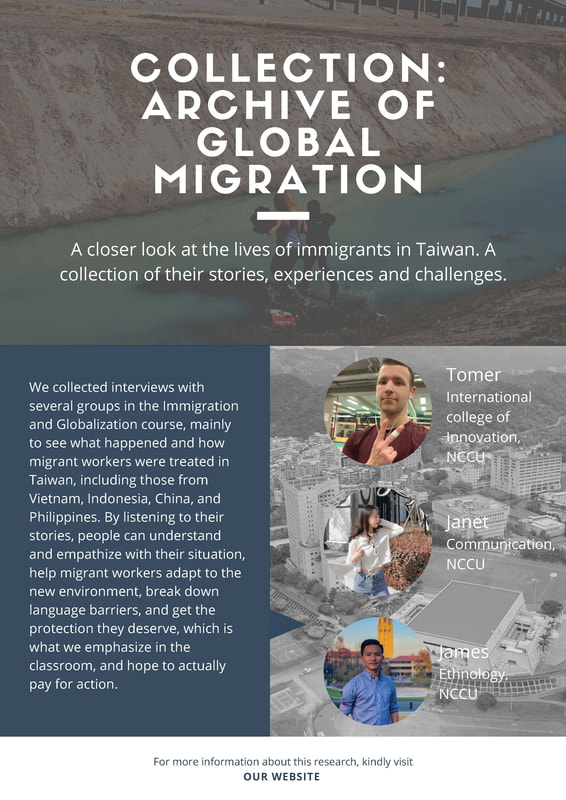Introduction
Eneng
在來台灣之前,她已經是一個孩子的母親。由於需要為家庭負責經濟狀況,她曾在一些工廠當過員工,並幫助過一些人,成為他們的家庭助理。她決定來台灣工作的主要原因,主要是為了改善她的家庭經濟狀況。
經過培訓和漫長的等待,Eneng終於在台灣開始了她的工作。起初,她在台北做過短期的兼職,後來中介給她介紹了一份照顧老人的看護工作。和大多數農民工的願望一樣,Eneng想有一份穩定的工作。但事情並沒有按照她的計劃進行。照顧工作實際上是一個騙局,她真正需要做的是在農場種水果、做三餐飯、照顧家裡的寵物和做從早到晚做家務,有時甚至需要打掃家裡親戚的房子。這沉重的負擔讓她難以承受,超出了她一開始的想像。
根據台灣法律,移工只能從事家政工人或產業工人方面的工作;因此,雇主顯然違反了規定,要求Eneng從事農業工作。除了法律方面,她做這種體力活,夏天要在陽光下種水果,還要學習照顧草莓、鳳梨等的技能,讓他實在難以忍受。她每天都在工作,從早上五點到晚上八點,這意味著她每天只有 9 個小時可以休息。在那裡工作了兩年多後,Eneng無法忍受生活的艱辛,於是決定離開。
談到印尼和台灣之間的文化差異,她說她很不習慣台灣人工作的速度。她的前雇主經常要求她工作要很快,這讓她頗具壓力。除此之外,雇主們似乎無法理解印尼的宗教,有時他們會告訴她豬肉很有營養,她應該嘗試一下,這些都造成Eneng許多不愉快的工作經歷。
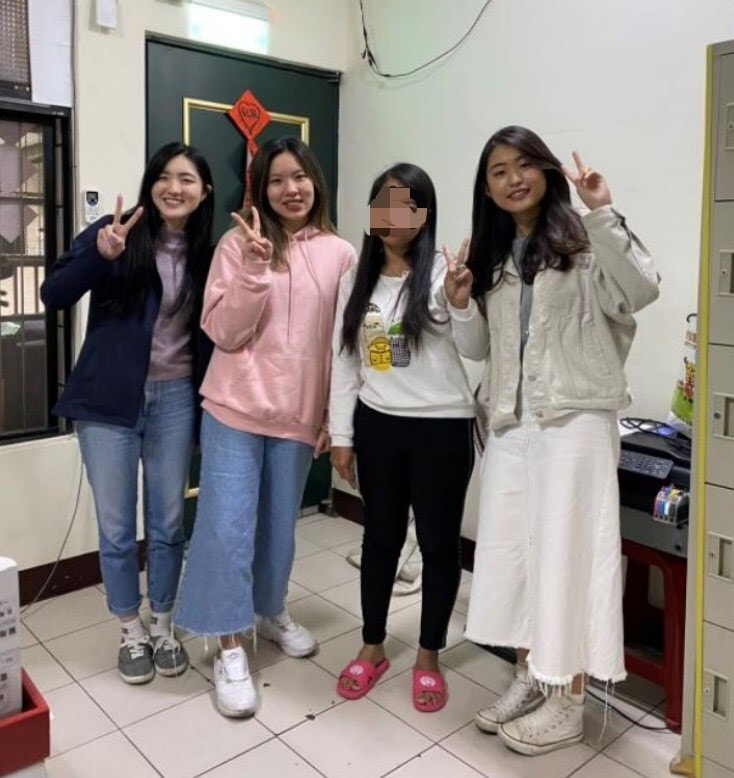 左圖是第ㄧ小組和Eneng(從右數來第二位)
左圖是第ㄧ小組和Eneng(從右數來第二位)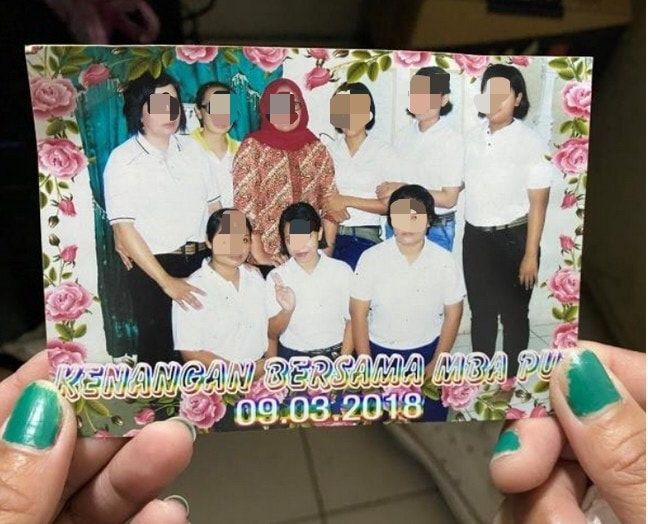 右圖是Eneng在他們培訓的最後一天,完成考試後拍攝的照片
右圖是Eneng在他們培訓的最後一天,完成考試後拍攝的照片Eneng
Eneng: Before coming to Taiwan, she was already the mother of a child. Since she needs to be responsible for the financial situation of her family, she worked as an employee in some factories and helped some people as their home assistants. The main reason she decided to work in Taiwan was to improve her family's financial situation.
After training and waiting for a long time, Eneng Fitri finally started her work in Taiwan. At first, she had a short-term part-time job in Taipei, and then the agency introduced her to a nursing job to take care of the elderly. Like the wishes of most migrant workers, Eneng Fitri wants to have a stable job. But things did not go according to her plan. According to her, the caretaking job was actually a scam. What she really needed to do was grow fruit on the farm, cook three meals, take care of family pets and do housework from morning to night, and sometimes she even had to clean the houses of the employer’s relatives. This heavy burden was unbearable, beyond her imagination at the beginning.
According to Taiwanese law, migrant workers can only work as domestic workers or industrial workers; therefore, the employer apparently violated the regulations when requiring Eneng Fitri to engage in agricultural work. In addition to the legal aspects, she had to do this physical work, growing fruits in the sun in summer, and learning the skills of caring for strawberries and pineapples, which she found was really unbearable for her. She worked every day, from five in the morning to eight in the evening, which means she only has 9 hours to rest each day. After working there for more than two years, Fitri couldn't bear the hardships of life, so she decided to leave.
Talking about the cultural differences between Indonesia and Taiwan, she said that she is not used to the speed at which Taiwanese work. Her former employer often asked her to work quickly, which made gave her serious stress. In addition, employers seem to be unable to understand Indonesian religion. Sometimes they would tell her that pork is very nutritious and she should try it. She summarizes her work experience in Taiwan as very unpleasant.
 On the left is group 1 and Eneng Fitri (the second from the right)
On the left is group 1 and Eneng Fitri (the second from the right) On the right is a photo taken by Eneng Fitri after completing the exams on the last day of her training.
On the right is a photo taken by Eneng Fitri after completing the exams on the last day of her training.Lina
Lina 16 歲才初中畢業,當時她考慮作為移民出國,因為高中相對於她的家庭收入來說相對昂貴。她的父母勸她早點結婚,但她認為自己太年輕,最終決定出國。然而,值得注意的是,她當時只有 16 歲,而且還需要幾年時間才能出國工作。最後,她聯繫幫助她在國外工作的機構,並試圖假冒她 21 歲的身份,但最終失敗了,之後花了整整 9 個月,直到Lina的經紀人終於把她的年齡改成了大5歲,才被批准離開印尼。在這段時間裡,Lina 仍然被迫支付了九個月的全部款項(20,000 新台幣 - 相對於她的家庭收入水平來說,這是一筆非常大的款項)。請記住,我們並不是在讚美 Lina 選擇繞過法律這一事實,但她不惜一切代價去台灣的決心,預示著如果她留在她的出生地,未來將是黯淡的。
她成功地來到了台灣。然而,她並沒有那麼適應她在台灣的生活。首先,文化差異很大,尤其是在台北。令人惱火的是,儘管她是一個真誠的穆斯林,但她還是被迫吃豬肉。當她的雇主問她是否可以吃豬肉時,她必須告訴他們她吃豬肉。實際上,經紀人強迫所有工人都用這樣的答案。關於文化的另一件事是關於筷子,來台灣之前,她從來沒有用過筷子,她記得她的一位雇主叫她學習如何用筷子在碗裡夾小花生,這聽起來像是訓練,但對她來說其實是一種折磨。飲用湯的文化也不同,在台灣,湯並非必要,但在印尼,湯被認為是主菜。
她作為看護到台灣,她先是照顧了一個老婆婆。與此同時,她被要求做家務。此外,她不被允許使用她的手機,導致她不能與她在印尼的家人聯繫,她的雇主甚至拿走了她的護照和錢,以防她逃跑。她試圖向她的經紀人尋求幫助,結果卻遭到指責和責罵。
即使Lina想尋求法律途徑,但只有在收集到充分的證據之後,才能證明雇主有罪。這是一個很大的問題,因為她提到她的雇主不僅持有她的重要文件,還持有她的手機,導致移民很難收集實質性證據。這件事意味著:當局沒有提供足夠好的環境來保障移民的權利和安全,而移民也無法選擇他們想要的雇主。她的經歷與其他移民的呼聲一致,即官僚機構是一個灰色地帶,仲介以直接和間接的方式剝削移民,例如收取額外費用或阻止移民轉移到其他就業管道,該機構在決定誰留下或誰被驅逐出境方面也擁有壓倒性的權力。他們內心深處的恐懼早已發生,移民不應該被迫繼續為他們的基本權利而奮鬥-如果他們仍然希望留在台灣。
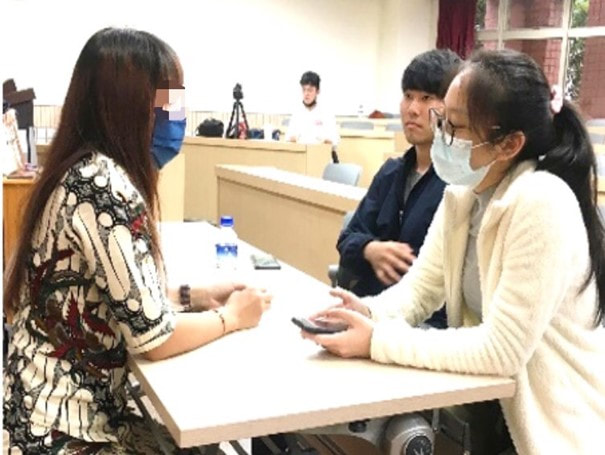 第2小組在教室裡訪談Lina(在圖片最左邊)
第2小組在教室裡訪談Lina(在圖片最左邊)Lina
Lina graduated from junior high school at the age of 16, when she considered going abroad as an immigrant, because high school cost is relatively expensive. Her parents advised her to get married early, but she thought she was too young and finally decided to go abroad. However, since she was only 16 years old at the time, it would take several years before she could go abroad to work. Finally, she contacted the agency that helped her work abroad and tried to pretend to be 21-years old, which she ultimately failed. After that, it took a full 9 months until Lina's agent agreed to change her age to 5 years older. Lina was still forced to pay all the payments for nine months.
She successfully came to Taiwan. However, she has not adapted well to her life in Taiwan. Notably to the huge cultural differences, especially in Taipei. She found it irritating that even though she is a Muslim, she is still forced to eat pork; when her employer asked her if she could eat pork, she was forced by the agency to tell them that she does. In fact, the broker forced all workers to make this response. Another cultural difference is the use of chopsticks which she found very difficult since before coming to Taiwan, she had never used chopsticks before.
She came to Taiwan as a caregiver, she first took care of an old woman. At the same time, she was asked to do housework. In addition, she was not allowed to use her mobile phone, which prevented her from contacting her family in Indonesia, and her employer even took her passport and money away to prevent her from escaping. She tried to ask her agent for help but he instead scolded her.
Even if Lina wants to seek legal actions, she can only prove her employer's guilt after collecting sufficient evidence. This is a big problem because she mentioned that her employer not only holds her important documents, but also holds her mobile phone, which makes it difficult for immigrants to collect substantial evidence. This means that the authorities have not provided a good enough environment to protect the rights and safety of immigrants, especially since immigrants cannot choose the employer they want. Her experience is consistent with the voices of other immigrants, such as charging extra fees or preventing immigrants from moving to other employment channels. The agency which decides who gets to stay and who is deported also has overwhelming power. The fear in their hearts is already great; immigrants should not be forced to continue fighting for their basic rights if they still want to stay in Taiwan.
 Group 2 interviewing Lina (on the left of the picture) at NCCU
Group 2 interviewing Lina (on the left of the picture) at NCCUcô Vân
在表姐的推薦之下,他在十二多歲的時候來到台灣,他之後嫁給了一位台灣人,並育有兩個孩子,在當地就讀小學。
李太太在表親的認識下遇見他的丈夫,兩人交往一段時間後,很快地便步入了婚姻。他計畫放棄原本在越南的生活,選擇跟隨丈夫到台灣定居,但在移民的過程中並不順利,在申請結婚簽證時,她被一名男子騙了數千元美元,之後她花了將近一年的時間才獲得移民許可證,因為她必須獨自與移民局打交道。漫長的申請過程讓她滯留在越南的不同城市,以便找到幫助她獲得移民許可證的人。
獲得移民許可證到台灣之後,接下來要面對的才是真正的難題。首先,她的普通話並不流利,也不熟悉環境,導致她和丈夫在剛結婚時幾乎天天吵架,直到兩個孩子出生,情況才逐漸好轉。再來,在移民融入台灣社會的道路上,存在許多障礙,例如他們可能在進入新社會的之前或之後,被迫支付額外的錢來申請許可證,並且許多人就算經過多年的辛勤工作仍無法取得永久居留權。
李太太的一天從她的食品攤生意開始(從早上六點到九點),她們出售各種越南美食,例如「Banh mi」,這是法國殖民時期做出的三明治。她的小吃攤在當地發展迅速,每天早晨都有大量顧客光臨,但是,如果沒有供應商的許可證,一但有人舉報她,她就得被開罰。其中有一次,警察給她一張票,她以為他要被開罰,但令他大吃一驚的是:警察用了一張空白的票讓她擺脫困境。儘管大多數的警察都很和藹可親,但畢竟她沒有承租或是購買店舖,所以她每天得將食物攤從家中搬回公園,這是十分麻煩又耗時的。售完所有食物之後,她得馬上返回工廠做代工。做完工之後,她得返家準備明早攤位要出售的食物,並且替家人煮晚餐。
她一天得做的工作非常多,因為她必須支付住房貸款、兩個孩子的學費和各種生活費用,她必須非常節儉,才能免強負荷這沈重的財務負擔。
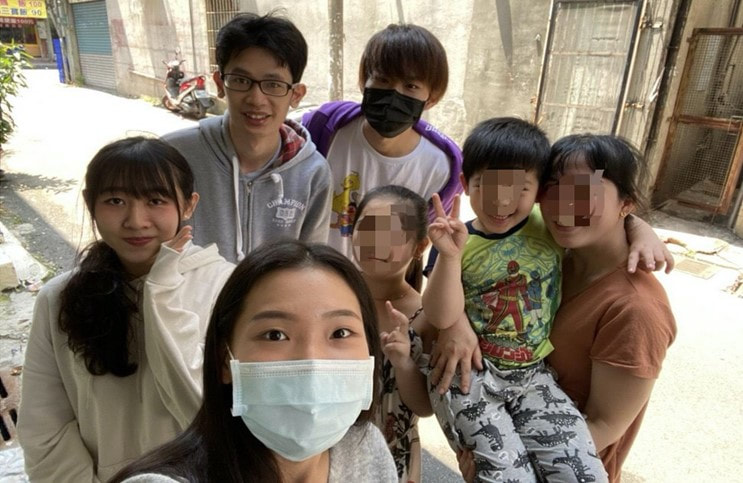 第三小組訪談到來自越南的李太太,在圖片最右邊是她與她的兩個孩子。
第三小組訪談到來自越南的李太太,在圖片最右邊是她與她的兩個孩子。cô Vân
Miss Lee came to Taiwan on the recommendation of her cousin when she was twelve years old. She later married a Taiwanese man, and has two children attending elementary school in Taiwan.
Miss Lee met her husband through her cousin, they soon got married after dating briefly. After marriage, Miss Lee planned to settle in Taiwan. However, without permanent residency, she went through a long process of migration. She has been cheated thousands of USD due to unfamiliarity with the application process. Finally, she got her permission after applying in different cities in Vietnam.
Miss Lee’s life didn’t get better after coming to Taiwan. her non-fluent Mandarin caused conflicts between her and her husband almost every day, this situation didn’t get better until their first kid was born. At work, Miss Lee had to pay a huge amount of her salary on maintaining her visa. In fact, she’s not alone, as most of the migrant workers also struggle with changing their visas to a permanent residency.
Miss Lee starts her day from her cuisine stands, she sells Vietnam cuisines Banh mi, which is an authentic Vietnam snack. Her business grows rapidly, however, if she does not have the supplier's license, she will be fined. On one occasion, the police gave her a ticket. She thought she was going to be fined, but what surprised her was that the police used a blank check to get her out of economic struggle. Although most police officers are very amiable, she did not rent or buy a shop after all, so she had to move the food stall from her home back to the park every day, which was very troublesome and time-consuming. After all the food was sold, she had to return to the factory to do OEM. After finishing work, she has to go home to prepare food for sale at the stall tomorrow morning and cook dinner for her family.
She has to do a lot of work a day, because she has to pay for the housing loan, the tuition of two children and all kinds of life expenses, she must be very frugal, in order to avoid the heavy financial burden.
 In the picture are group 3 interviewing Miss Lee. On the far right you can see her with her two children.
In the picture are group 3 interviewing Miss Lee. On the far right you can see her with her two children.cô Thu
2000年來台攻讀碩士學位,現今是國立台灣師範大學教育系的碩士生,是一位台灣人的妻子,兩個孩子的母親,並且兼任越南文老師。
她來台灣讀書,同時也有賺錢的目的,然而,她並沒有像其他的移工那樣面臨那麼多問題。在語言方面,通常在跨國婚姻中,夫妻往往很難溝通,但因她在台灣師範大學修讀過類似IUP的課程,所以她有很多時間練習中文,從而獲得良好的中文水平。此外,由於她結婚前已在台灣生活多年,因此對台灣文化有更多的了解,這些經歷都讓她能夠很快地並且輕鬆地適應台灣的生活;在教育孩子方面,她的家人的思想開放,也很尊重她。Dinh Thi Thu認為沒有必要將她的孩子塑造成「真正的越南人」,因為她的孩子的身份不能簡單地用「台灣人」或「越南人」來定論,所以她並沒有極端地限制孩子只能學習中文或是越南文,她認爲這些都不是判定孩子的依據,於是她以越南文為孩子的第二語言,在教導孩子中文的同時,也不忘傳輸母親的越南文與越南文化,讓自己的文化可以傳承下去;在種族歧視議題方面,台灣媒體的報導時常會傳達偏見,歪曲了有關東南亞移民的事實,因此讓台灣人在一定程度上受到影響並持有偏見。例如,有些台灣人會認為:在台灣工作的移工是導致國內失業率攀升和秩序混亂的原因之一。但事實上是,儘管確實有犯罪者是移工,媒體往往會更強調他們的身份。在 Dinh Thi Thu的經歷中,她曾經在兼職期間經歷過同事對她的歧視,但她相信近年來台灣的環境對移工變得更加友好。她最後也說,任何人都不應該對他人有歧視或偏見,並強調文化教育的重要性。
即使我們了解台灣移民的處境,如被歧視、語言障礙等等,我們也一定程度上被刻板印象所束縛,認為他們不可避免地面臨這些問題,無法找到真正的解決之道並有能力可以自己解決。
由上述的故事可以得知,我們不應低估Dinh Thi Thu的積極心態和努力。她是一位獨立、堅定的女性,她設法盡力克服她所面臨的挑戰。她正在努力實現自己的夢想,並以開辦文化教育工作坊為目標,此外,儘管家庭經濟負擔沉重,但她並沒有將所有收入都給家人,而是很好地管理她的錢。同時,她深信教育是照亮未來的最佳解決方案,並且會花時間來學習更多技能來提升自己。
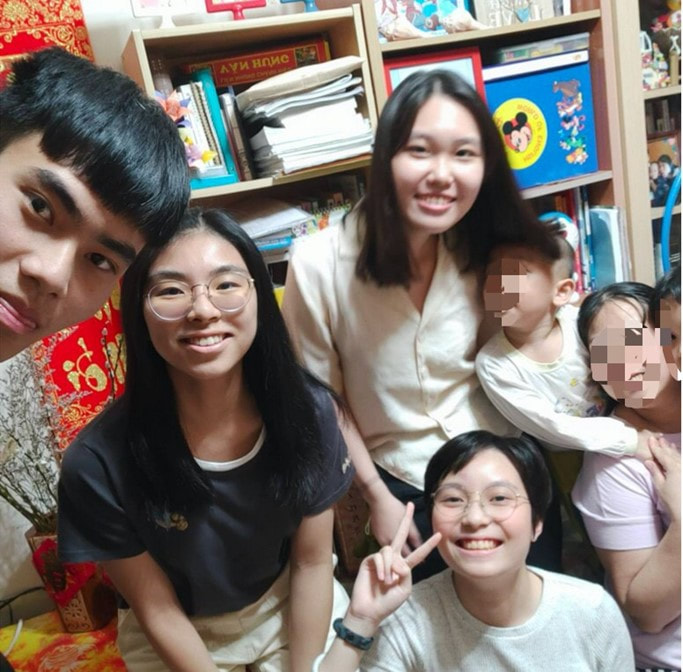 第六小組訪談到Dinh Thi Thu,在圖片的最右邊是她與她的兩個孩子。
第六小組訪談到Dinh Thi Thu,在圖片的最右邊是她與她的兩個孩子。cô Thu
Dinh Thi Thu came to Taiwan in 2000 pursuing her master's degree. Now she is a master's student in the Education Department of National Taiwan Normal University. She is the wife of a Taiwanese, a mother of two children, and a part-time Vietnamese teacher.
Dinh Thi Thu came to Taiwan not only to study, but also to make money. Luckily, she did not face as many problems as other migrant workers. In terms of language, it is often difficult for couples to communicate in transnational marriages, but since she has taken courses (IUP) at Taiwan Normal University, she had a lot of chances to practice her Chinese, which she now speaks fluently. In addition, since she has lived in Taiwan for many years before getting married, she has a good understanding of Taiwanese culture. All these experiences have enabled her to adapt to life in Taiwan quickly and easily. In terms of her children’s education, her family is open-minded and respective of her decisions. Dinh Thi Thu believes that there is no need to makes her children into "real Vietnamese", because the identity of her children cannot be determined simply by "Taiwanese" or "Vietnamese". So, she did not limit her children to learn only Chinese or Vietnamese and she believes that decision is not critical, thus allowing her children to learn Vietnamese as their second language. While teaching her children Chinese, she also teaches them some Vietnamese and Vietnamese culture which lets her own culture be passed on.
In terms of racial discrimination, she thinks Taiwanese media reports often convey prejudices and distort the facts about immigrants from Southeast Asia. In that way, Taiwanese people are affected and gain bad opinions of migrant workers. For example, some Taiwanese may regard migrant workers working in Taiwan as one of the reasons for the rising unemployment rate and disorder in the country. But the fact is: although some of the offenders may be migrant workers, the media tends to emphasize their identity. From Dinh Thi Thu's perspective, she has experienced discrimination by her colleagues during her part-time job, but she also believes that the environment in Taiwan has become more friendly to migrant workers in recent years. She states that no one should discriminate or prejudice against others, while she also emphasized the importance of cross-cultural education.
According to the story above, we should not underestimate Dinh Thi Thu's positive attitude and hard work. She is an independent and determined woman, and she tried her best to overcome the challenges she faced. She is working hard to make her dreams come true and aims to establish a cultural and educational workshop. In addition, despite the heavy financial burden of having to send money back to her family in Vietnam, she does not give all of her income to her family, and instead manages her portfolio well. At the same time, she is convinced that education is the best way to bring a brighter future, and she will spend time to learn more skills which will help her improve herself.
 In the picture are group 6 interviewing Dinh Thi Thu. On the far right you can see her with her two children.
In the picture are group 6 interviewing Dinh Thi Thu. On the far right you can see her with her two children.chị Thu
陳女士來自越南北部的河內。她的家人住在農村,以務農為生。但收入並不十分充足,作為一個姐姐,她決定在高中畢業後立即工作,以支付兄弟姐妹的學費。但即使每天加班,在越南的收入也不夠,所以當同事告訴她收入更高的台灣工作機會時,她才考慮移民。來台灣之後,她每天工作將近 16 個小時,但相對較高的收入讓她留下來,為了養家糊口,她忍受了艱苦的日子。
陳女士人生的轉折點是她在台灣的婚姻,讓她有了「陳女士」的新角色。進入台灣家庭,使她成為台灣公民。但這反而造成她更大的壓力,這種壓力來自她擔心自己是個不稱職的工人而被工廠開除、賺錢還債的責任和害怕連累家人。陳女士提到她在台灣遭遇車禍,並說她不敢報警,因為她害怕如果她把麻煩擴大,她會被送回越南。此外,陳女士說:「不僅是仲介費,我還必須向該機構支付其他費用,同時,我還要面臨同事將她視為競爭對手的壓力。」
一些台灣人仍因謠言、外表和語言差異而對移工產生刻板印象。陳女士雖然對在台灣的生活相當滿意,但也遇到了一些鄙視新移民的人。
來到台灣後,陳女士與同樣來自越南的同事們有著緊密的聯繫,在便利商店也經常遇到其他移工們。她們有時會邀請陳女士出去玩或是來一趟小旅行。然而,陳女士並沒有把錢花在娛樂上,而是多幹活,把大部分工資存起來。因此,可以平衡工作和生活的休閒娛樂有時會缺乏,而對她的心理健康沒有足夠的支持。
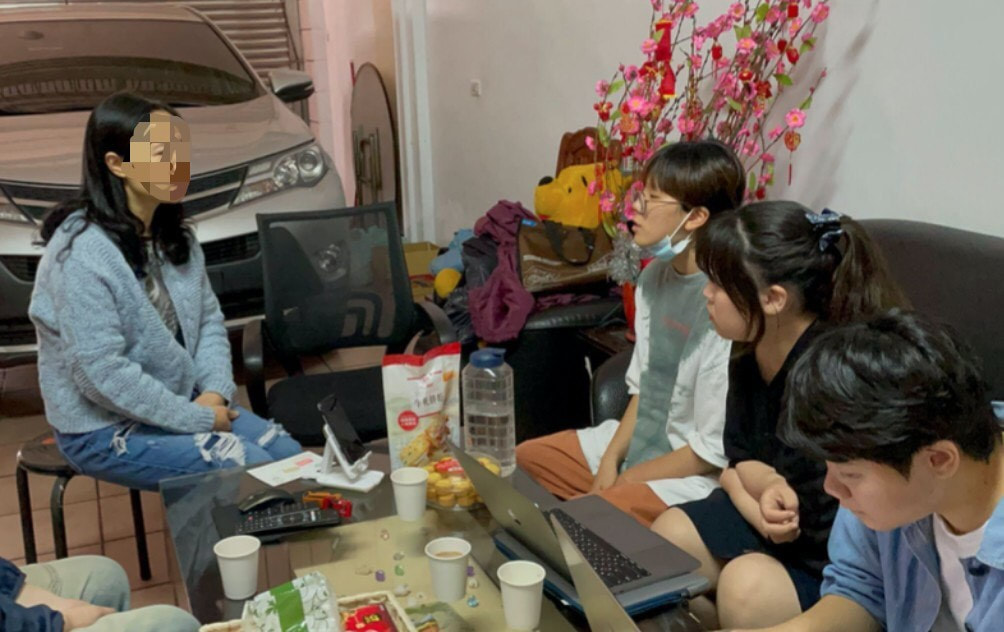 第八小組正在訪談陳女士(圖片中最左邊,著藍色外套和牛仔褲的女性)
第八小組正在訪談陳女士(圖片中最左邊,著藍色外套和牛仔褲的女性)chị Thu
Ms. Chen is from Hanoi, northern Vietnam. Her family lives in the countryside and earns a living from farming. But the income is not sufficient. She decided to work immediately after graduating from high school to pay for the tuition of her brothers and sisters. But even if she worked overtime every day, her income in Vietnam is not enough, so she decided to immigrating when a colleague told her about a higher-paying job opportunity in Taiwan. After coming to Taiwan, she started working approximately 16 hours a day, and her relatively high income allowed her to stay. In order to support her family, she endured hard days.
The turning point in Ms. Chen's life was her marriage in Taiwan, which gave her a new role as "Ms. Chen". Although that makes her a Taiwanese citizen, this also gives her more pressure, mostly coming from her worry that she was an incompetent worker. In addition, Ms. Chen said: "Not only do I need to pay the agency fee, I also have to pay other fees to the agency and other institutions. "
Some Taiwanese still have stereotypes about migrant workers due to rumors, appearance and language differences. Although Ms. Chen is comfortable with Taiwanese living style, she also meets some people who despise new immigrants.
After coming to Taiwan, Ms. Chen has close connections with colleagues who are also from Vietnam, and she often meets new friends in convenience stores.
Instead of spending money on entertainment, she works more and saves most of her wages. Therefore, it is possible to have a work life balance, but results in exhaustion.
 Group 8 interviewing Miss Chen (on the far left in Jeans and a blue sweater)
Group 8 interviewing Miss Chen (on the far left in Jeans and a blue sweater)cô Bích
一位越南女性,她和許多同齡人一樣,在海外結婚,希望過上更好的生活。她22歲來到台灣,到如今已經21年多了。
在過去的二十年裡,台灣的跨國婚姻有所增加。越來越多的台灣男人與來自東南亞國家和中國大陸的女人結婚。這些婦女通常來自社會經濟背景低下,並且幾乎沒有接受過正規教育,而來台灣是為了更好的機會,所以那個時期很多越南女性選擇了嫁到海外。受訪者明確表示:自己的祖國缺乏資源,而在台灣,尤其是在教育和醫療方面的資產更多。
然而,胡氏碧還是遇到了一些外國新娘必須面對的常見困難。這包括語言障礙、教育和財務問題。
缺乏共同語言會抑制丈夫和妻子之間以及住在一起的丈夫的家庭之間的交流。她提到:「剛來的時候,我根本不會說普通話,也沒有任何交流方式。」她意識到語言障礙確實阻礙她進行日常活動和與他人交流,語言障礙會阻礙人們獲得醫療保健等重要服務。有鑑於此,她利用空閒時間參加語言課程,希望能提高自己的語言技能。此外,她還指出,雖然她有明確的升學願望,但由於同時要照顧家庭的壓力和要求,她無法讓升學和工作同時進行。這說明,雖然她獲得了移居台灣的新機會,但仍面臨阻礙她充分認識自己的問題。
她目前最大的擔憂之一是她的財務狀況。這是由於她丈夫的去世和她的移民身份。正因為如此,她現在不得不承擔所有的經濟責任。她目前必須在不同的工作單位中長時間工作,這意味著她花在其他活動上的時間更少,例如她的學習和她經營的小生意。
雖然胡氏碧女士來台灣遭遇到種種困難,但她仍持樂觀的態度去看待一切,積極把握時間學習和經營自己的小生意。從長遠來看,她從移民台灣中受益,因為她的整體生活水平提高了,使胡女士成為移民的成功案例。
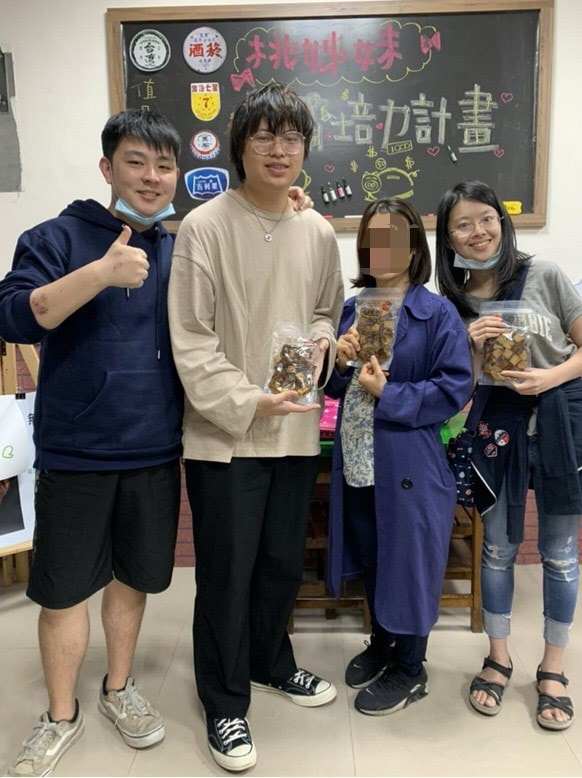 左圖是第十小組和胡氏碧(從右數來第二位)
左圖是第十小組和胡氏碧(從右數來第二位)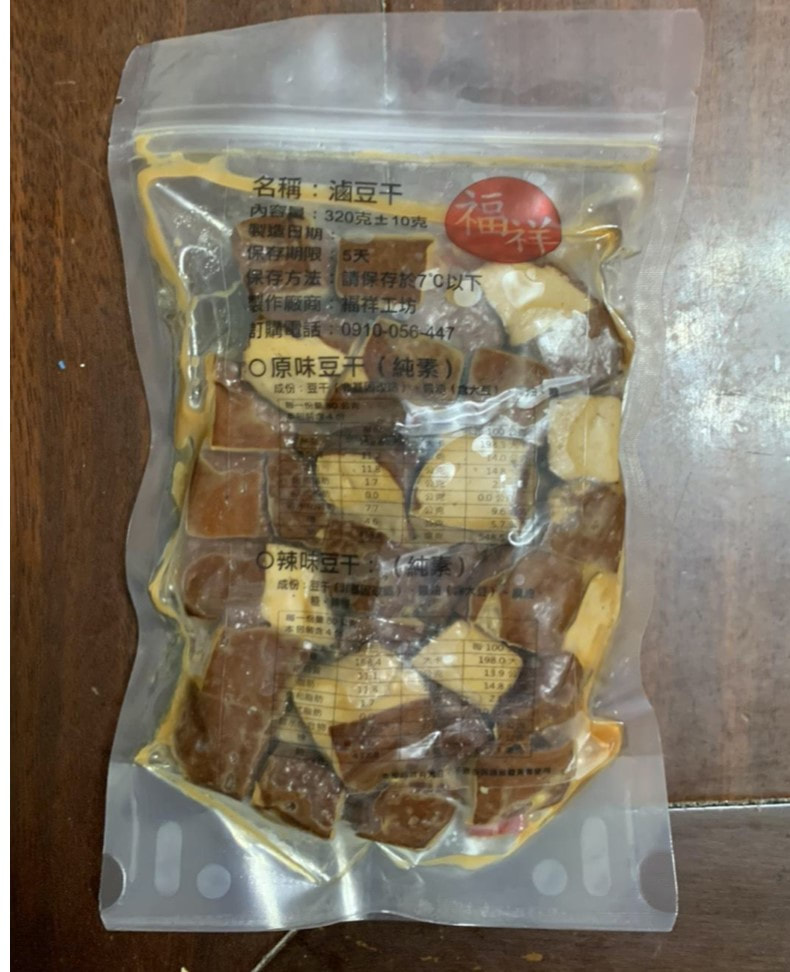 右圖是胡氏碧自己經營生意所賣的滷豆乾
右圖是胡氏碧自己經營生意所賣的滷豆乾cô Bích
A Vietnamese woman, similar to many of her peers, she married overseas, hoping to live a better life. She came to Taiwan 21 years ago at the age of 22. In the past two decades, there has been an increase in transnational marriages in Taiwan. More and more Taiwanese men marry women from Southeast Asian countries and mainland China. These women usually come from a low socio-economic background and have almost no formal education. They came to Taiwan for better opportunities, which they hope to attain through marriage. Interviewees made it clear that their home country lacks resources, and Taiwan has more assets, especially in education and medical care.
However, 胡氏碧 still encountered some common difficulties that foreign brides must face. This includes language barriers, education and financial issues.
The lack of a common language causes communication difficulties between husband and wife and between the husband’s family. She mentioned: “When I first came, I didn’t speak Mandarin at all, and I didn’t have any communication methods.” She realized that the language barrier really hinders her from performing daily activities and communicating with others, and that it can hinder people's access to health care and other important services. Due to this, she uses her free time to participate in language courses, hoping to improve her language skills. In addition, she also pointed out that although she has a clear desire for further studies, she cannot allow herself to proceed with her studies and work at the same time due to the pressure and requirements of taking care of her family. This shows that although she has obtained a new opportunity to emigrate to Taiwan, she still faces problems that prevent her from fully expressing herself.
One of her biggest worries at the moment is her financial situation. This is due to the death of her husband and her immigrant status. Because of this, she now has to bear all financial responsibilities. She currently has to work long hours in different work units, which means she spends less time on other activities, such as her studies and the small business she runs.
Although 胡氏碧 encountered various difficulties in coming to Taiwan, she still looked at everything with an optimistic attitude and actively took the time to learn and run her own small business. In the long run, she has benefited from immigrating to Taiwan because her overall living standards have improved, making her a successful case of immigrants in Taiwan.
 The picture on the left is group 10 and 胡氏碧 (second from the right)
The picture on the left is group 10 and 胡氏碧 (second from the right) The picture on the right is the braised tofu sold by 胡氏碧's own business
The picture on the right is the braised tofu sold by 胡氏碧's own business伊瑪
伊瑪是一名 29 歲的印尼青年,在家鄉經營著一家家具店。有一次,他被人騙了錢,導致她無法繼續他熱愛的事業,面對巨大的金融危機的情況之下,一位朋友告訴伊瑪:在台灣工作可以有機會賺到重新開店所需的錢。於是,伊瑪隻身來到台灣,在鐵廠打工,追尋自己的夢想。
他在台灣的鐵廠工作了兩年,有一次他在工作中受傷,而永遠失去了右大腳趾。伊瑪被分配到一家鐵廠工作,他的經紀人並沒有讓他事先接受任何職業培訓或安全計劃。據伊瑪告訴我們,經紀人和工廠老闆只是告訴他:「投入工作,不要傷害自己。」伊瑪經常使用重達 500 公斤的工業鐵,在沒有配戴適當安全設備的情況下熔化和成型鐵。有一天,未固定的鐵塊滑落下來,砸到了伊瑪的腳,他痛得差點昏過去,卻隱約聽到老闆罵他笨,說他什麼都做不好。更可惡的是,老闆竟然說要等經紀人來,才能送他去醫院,伊瑪只能默默的抑制血流,試圖緩解傷口的疼痛。等了一個小時後,伊瑪終於到了醫院,醫生告訴他,他已經錯過了黃金急診期,受感染的大腳趾必須截肢。由於骨頭也被壓碎了,醫生說伊瑪至少要休息兩個月才能回去工作。然而,兩週後,雇主敦促伊瑪盡快返回工作崗位。鐵廠的衛生環境很差,未癒合的傷口再次感染,導致伊瑪發高燒,只能把傷口的縫線拆掉再重新縫合。
伊瑪在工作中受傷時,並沒有通過賠償制度追討受傷和損失。據伊瑪說,他的雇主不願意提供任何事故後的護理和補償。由於語言障礙和法律能力不足,讓伊瑪難以理解法律。換句話說,他們對工人權利和勞動保護沒有完全了解。法律能力低的移工往往對法律問題不採取行動,因為司法系統太難以接近或太昂貴而無法用來解決法律問題,導致他們不知道從哪裡開始尋求幫助。因此,他們選擇保持沉默。幸運的是,在收容所工作人員的幫助下,伊瑪逐漸康復,為了獲得賠償,勞資協調仍在進行中。像伊瑪這樣的外來工人正在經歷高風險的勞動環境,而這是台灣一系列有關移工的複雜問題,產業結構、經紀人、工廠主、勞動相關法律都在這個話題中有著巨大的影響力。
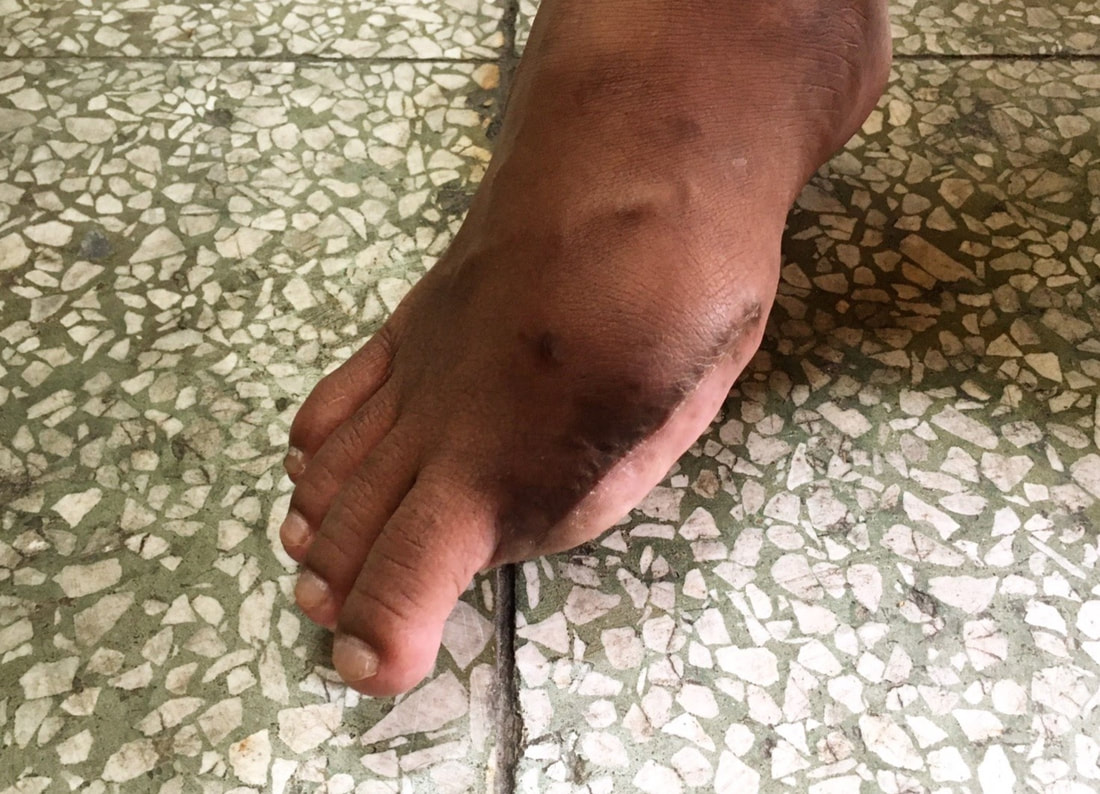 因為在工作中受傷,永遠失去了右大腳趾的伊瑪。
因為在工作中受傷,永遠失去了右大腳趾的伊瑪。Imam
Imam is a 29-year-old Indonesian man who ran a furniture store in his hometown. Once, he was defrauded of money, which made him unable to continue the career he loved. Faced with the huge financial crisis, a friend told Imam working in Taiwan can have the opportunity to earn what he needs to reopen the store. Imam came to Taiwan alone, working in an iron factory, pursuing his dream. He worked in Taiwan for two years, where he was injured at work and lost his right big toe forever. Imam was assigned to work in an iron factory, and his agent did not allow him to receive any vocational training or safety plans in advance. According to Imam, the agent and the factory owner just told him: "Go to work and don't hurt yourself."
Imam often uses industrial iron weighing up to 500 kilograms to melt and shape the iron without wearing proper safety equipment. One day, an unfixed piece of iron slipped down and hit Imam’s foot. He almost passed out in pain, but vaguely heard the boss scold him for being stupid, saying that he could not do anything well. What's more frustrating is that the boss said that he had to wait for the agent to come before he could be sent to the hospital. Imam could only suppress the blood flow silently, trying to relieve the pain of the wound. After waiting for an hour, Imam finally arrived at the hospital. The doctor told him that he had missed the golden emergency period and the infected big toe must be amputated. Since the bones were also crushed, the doctor said that Imam would have to rest for at least two months before returning to work. However, two weeks later, the employer urged Imam to return to work as soon as possible. The sanitary environment in the iron factory was very poor. Unhealed wounds were re-infected, causing Imam to have a high fever, so the sutures of the wounds had to be removed and re-sutured.
When Imam was injured at work, he did not recover the injuries and losses through the compensation system. According to Imam, his employer is unwilling to provide any post-accident care and compensation. Due to language barriers and insufficient legal skills, it is difficult for Imam to understand the law. In other words, they do not fully understand workers' rights and labor protection. Migrant workers with low legal capacity often do not take action on legal issues because the judicial system is too inaccessible or too expensive to be used to solve legal issues, so they do not know where to start seeking help. Therefore, they chose to remain silent.
Fortunately, with the help of the staff at the shelter, Imam gradually recovered. In order to obtain compensation, labor-management coordination is still in progress. Migrant workers like Imam are experiencing a high-risk labor environment, and this is a series of complex issues related to migrant workers in Taiwan. Industrial structure, brokers, factory owners, and labor-related laws all have a huge influence on this topic.
 Because of an injury at work, Ima who lost her right big toe forever.
Because of an injury at work, Ima who lost her right big toe forever.Nani
一名看護長工(工作時超過8小時),在阿拉伯工作長達8年,但她覺得在阿拉伯工作時間太長又太累,在朋友的推薦之下,她聽說台灣的工資和待遇比較好而來台灣工作。
但在台灣工作一段時間之後,她發現她的期望和現實有很大的落差。在飲食方面,她認為阿拉伯的食物比台灣的好吃,因為阿拉伯菜的口味跟印尼菜比較接近,如何使用筷子也成為她需要練習的事情,此外,有些雇主還會偏向選擇可以吃豬肉的移工(印尼移工大多信仰伊斯蘭教);在與雇主的相處模式上,阿拉伯雇主會在閒暇時跟Nani聊天,而且比較大方,而台灣雇主則除了命令她時會跟她說話之外,幾乎零交流,導致她喪失可以練習說中文的機會,現在也只是會聽跟講幾句簡單的中文而已,中文字是完全看不懂的。除此之外,他們也很小氣,不準Nani開冰箱,或是拿桌上的食物來吃。
為什麼在台灣有諸多不適應的地方,還是依然選擇前來呢?因為來台灣工作只需到晚上九點勝過在阿拉伯工作時要到晚上12點。但問題來了,由於看護工大多是照顧失智老人,有些老人晚上不睡覺,甚至有些還會打人,這些突發狀況讓Nani在無形之中加長了工時,並且雇主通常不會給加班費用。此外,曾有雇主怕他會逃走,而拿走他的護照跟錢,雖然她有想過尋求法律途徑,但證據不足加上中文能力低落等因素讓她怯步。
現在她在桃園的群眾服務協會尋求庇護,在這裡她可以在較好的環境中生活。在工作中陷入勞資糾紛的本地勞工與資方對抗時,他們替移工們維護權益,對移工進行救援工作。以Nani自身經驗來說,她希望能將看護工納入勞期法,在工時和工資上有更完善的保障。
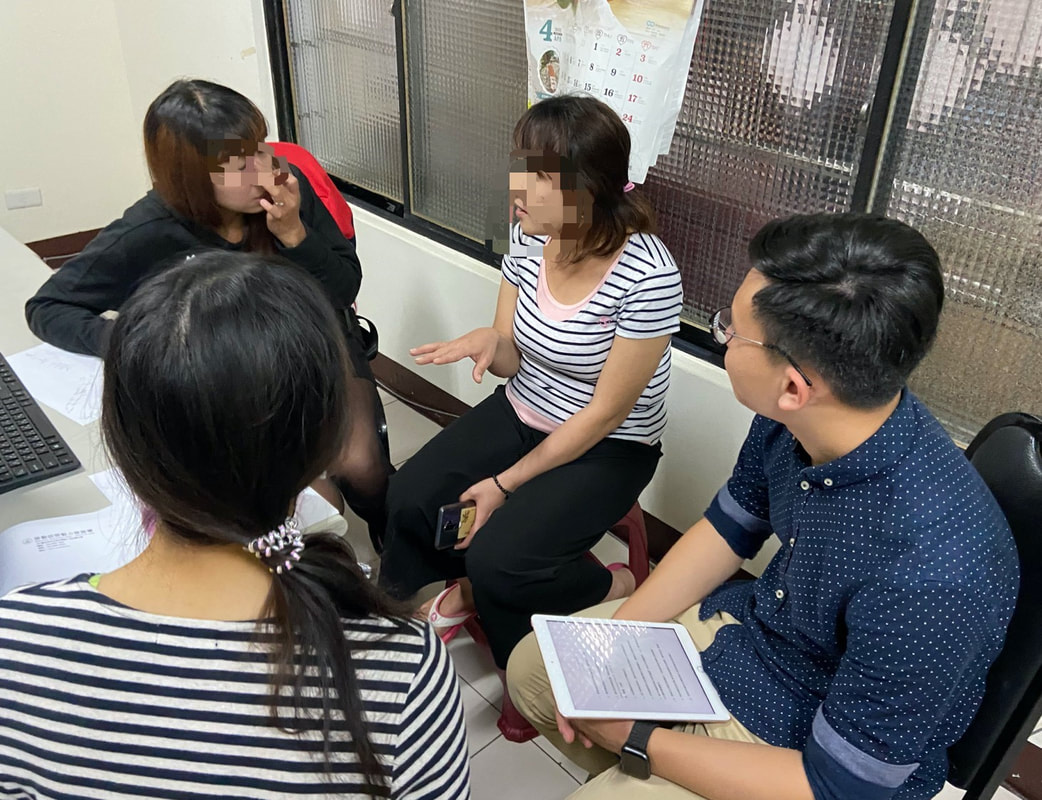 第七小組正在訪問Nani(圖片中間),圖片左邊是幫忙把印尼話翻譯成中文的人員
第七小組正在訪問Nani(圖片中間),圖片左邊是幫忙把印尼話翻譯成中文的人員Nani
Nani is long-term caregiver (working more than 8 hours). She has worked in Saudi Arabia for 8 years, but she felt that working hours in Saudi Arabia are too long and too exhausting. On the recommendation of a friend, she came to Taiwan when she heard that Taiwan’s wages are better.
But after working in Taiwan for a period of time, she found that her expectations and reality were different. In terms of diet, she believes that Arab food is better than Taiwan’s because the taste of Arab food is closer to that of Indonesian food. In Taiwan, using chopsticks has become a challenge she needs to conquer. In addition, some employers will also prefer to choose pork-included dishes (Most Indonesian migrant workers are Muslim and cannot eat pork). In terms of getting along with her employers, Arab employers will chat with Nani in their leisure time and are more generous, while Taiwanese employers will tell her almost nothing except when giving her orders. The lack of communication has caused her to miss the opportunity to practice speaking Chinese. Now she can only say and understand a few simple Chinese sentences while Chinese characters are completely incomprehensible. In addition, the employers are also very stingy and forbid Nani to open the refrigerator or take the food on the table to eat.
Since most of the care workers are taking care of the demented elderly, some elderly people do not sleep at night, and some even beat the workers. Having many emergencies make Nani increase the working hours, while the employer usually does not pay overtime. In addition, an employer once took away her passport and money because they were afraid that she would run away. Although she had thought of seeking legal means, the lack of evidence and her low Chinese ability made her daunted.
Now she seeks asylum in the “Serve the People Association-SPA”, in Taoyuan, where she can live in a better environment. When local workers got caught up in labor disputes at work and confronted the management, they defended their rights and provided new work for migrant workers. Based on Nani's own experience, she hopes that caregivers can be included in the labor period law so that they can have more protection, better working hours and higher wages.
 Group 7 visiting Nani (in the middle of the picture). On the left of the picture are people who helped translate Indonesian into Chinese
Group 7 visiting Nani (in the middle of the picture). On the left of the picture are people who helped translate Indonesian into Chinese
